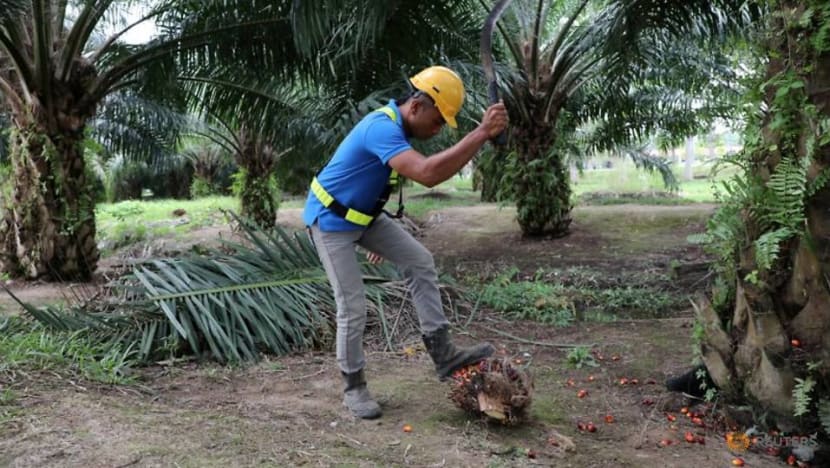US bans Malaysian palm oil giant Sime Darby over forced labour

FILE PHOTO: A Sime Darby Plantation worker collects palm oil fruits at a plantation in Pulau Carey, Malaysia, January 31, 2020. REUTERS/Lim Huey Teng
WASHINGTON: The US said it will ban all shipments of palm oil from one of the world’s biggest producers after finding indicators of forced labour and other abuses on plantations that feed into the supply chains of some of America’s most famous food and cosmetic companies.
The order against Malaysian-owned Sime Darby Plantation and its local subsidiaries, joint ventures and affiliates followed an intensive months-long investigation by the US Customs and Border Protection’s Office of Trade, said Ana Hinojosa, one of the agency’s executive directors.
Hinojosa said the investigation “reasonably indicates” abuses against workers that included physical and sexual violence, restriction of movement, intimidation and threats, debt bondage, withholding of wages and excessive overtime. Some of the problems appeared to be systemic, occurring on numerous plantations, which stretch across wide swaths of the country, she said.
“Importers should know that there are reputational, financial and legal risks associated with importing goods made by forced labour into the United States,” Hinojosa said in a telephone press briefing.
The order was announced just three months after the federal government slapped the same ban on another Malaysian palm oil giant, FGV Holdings - the first palm oil company ever targeted by Customs over concerns about forced labour. The US imported US$410 million of crude palm oil from Malaysia in fiscal year 2020, representing a third of the total value shipped in.
The bans, triggered by petitions filed by non-profit groups and a law firm, came in the wake of an in-depth investigation by The Associated Press into labour abuses on plantations in Malaysia and neighboring Indonesia, which together produce about 85 per cent of the US$65 billion supply of the world's most consumed vegetable oil.
READ: COVID-19 pandemic forces Malaysian palm industry to rethink reliance on foreign labour
Palm oil can be found in roughly half the products on supermarket shelves and in most cosmetic brands. It’s in paints, plywood, pesticides, animal feed, biofuels and even hand sanitiser.
The AP interviewed more than 130 current and former workers from two dozen palm oil companies, including Sime Darby, for its investigation. Reporters found everything from rape and child labor to trafficking and outright slavery on plantations in both countries.
Earlier this month, 25 Democratic lawmakers from the US House Ways and Means Committee cited AP’s investigation in a letter calling for the government to come down harder on the palm oil industry in Malaysia and Indonesia, asking Customs and Border Protection if it had considered a blanket ban on imports from those countries.
“In our view, these odious labor practices and their pervasive impact across supply chains highlight the need for an aggressive and effective enforcement strategy,” the letter said.
Sime Darby, which did not immediately comment, has palm oil plantations covering nearly 1.5 million acres, making it one of Malaysia's largest producers. It supplies to some of the biggest names in the business, from Cargill to Nestle, Unilever and L'Óreal, according to the companies’ most recently published supplier and palm oil mill lists.
Hinojosa said the agency’s decision to issue the ban should send an “unambiguous” message to the trade community.
“Consumers have a right to know where the palm oil is coming from and the conditions under which that palm oil is produced and what products that particular palm oil is going into,” she said.
The announcement marked the 14th time this year Customs has issued an order to detain shipments from an array of sectors following similar investigations into forced labor. They include seafood and cotton, along with human hair pieces believed to have been made by persecuted Uighur Muslims in Chinese labor camps.
Under Wednesday’s order, palm oil products or derivatives traceable to Sime Darby will be detained at US ports. Shipments can be exported if the company is unable to prove that the goods were not produced with forced labor.










